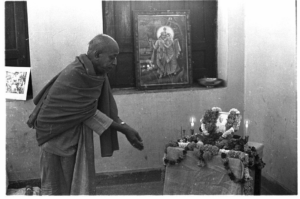Hari is the Supreme Truth, the Possessor of All Powers and the Incarnation of Rasa
- hari eka para-tattva, 2. tini sarva-saktiman, 3. tini rasa-murti
The first teaching is that Hari is the Supreme Truth. Syama[1] is the possessor of all potencies and the embodiment of rasa.
He gives supreme bliss to the Jiva and He resides eternally in His abode in the spiritual sky[2].
The Veda-sastra places these three prameyas regarding Lord Krishna in the hearts of the jivas.
The principle of Jiva
- Jiva-tattva
The second teaching concerns Jiva-tattvas, which are vibhinnamsa[3]. They are infinite in number and are atomic conscious units.
The two different types of Jiva are eternally bound and eternally liberated
- Nitya-baddha o 6. nitya mukta bhede Jiva dui prakara
Jivas are of two types: eternally conditioned[4] and eternally liberated[5]. They reside in the spiritual sky and the material universe respectively.
The conditioned Jiva
Baddha-jiva
Being averse to Krishna, the imprisoned Jivas worship Maya. They enjoy and suffer in unlimited universes.
The liberated Jiva
Mukta-jiva
The eternally liberated Jivas worship Krishna and are His associates. They enjoy in the spiritual sky and possess the wealth of prema.
These are the three prameyas regarding the Jivas. The Sruti-sastra, who are the servants of Krishna, teach this.
The Jiva in relation to simultaneous unity and difference
- Acintya-bhedabheda sambandha
Whether they are in the spiritual world or the material world, they are all inconceivably one and different from the Lord.
All things, including Jivas and matter, are potencies of Krishna and inconceivably one and different from Him. The Sruti-sastra declares this.
Through this knowledge the Jiva understands: I am Krishna-dasa. Krishna is my eternal Lord. He appears as a spiritual sun.
The Veda-sastra speaks of sakti-parinama[6]. Vivarta[7] is a corrupt philosophy, a deception created by transgressors of the Veda[8].
The seventh Prameya concerns Sambandha-jnana
Satati prameya sambandha jnana
This seventh prameya concerns sambandha-jnana. The Sruti-sastra gives this excellent teaching.
The Vedas also give instructions on the essential abhidheya, the nine processes of Krishna-bhakti, as well as vidhi[9] and raga[10].
Abhideya, the Nine Processes of Bhakti
- Abhidheya: nava-vidha bhakti
Hear, chant, remember, worship, offer prayers, offer service, become servants of the Lord, become friends of the Lord, and offer oneself fully[11].
Among these various types of bhakti, chanting the Holy Name is the most essential. Thus, the Vedas have propagated the glories of pranavas[12].
The goal is Krishna-prema
- Prayojana krishna-prema
If a human being takes refuge in suddha-bhakti, then by the power of Krishna’s mercy, he obtains the wealth of prema.
[1] Sri Krishna of Vrindavana.
[2] Samvyoma.
[3] An integral but external part of the Supreme.
[4] Nitya-baddha.
[5] Nitya-mukta.
[6] The idea that the world is a manifestation of Krishna’s energies.
[7] The idea that the world is a direct transformation of the Lord.
[8] The Veda teaches that the world is a product of the energy of the Lord, not a direct manifestation of Him.
[9] Devotion according to rules.
[10] Spontaneous devotion to Krishna without rules.
[11] Sravanam kirtanam visnoh smaranam pada-sevanam arcanam vandanam dasyam sakhyam atma-nivedanam (Srimad-Bhagavatam 7.5.23-24).
[12] Om, Omkara.
This is a section of the book “Harinama Cintamani (English)”.
To buy the complete book, click above
Post view 158 times




Leave a Reply